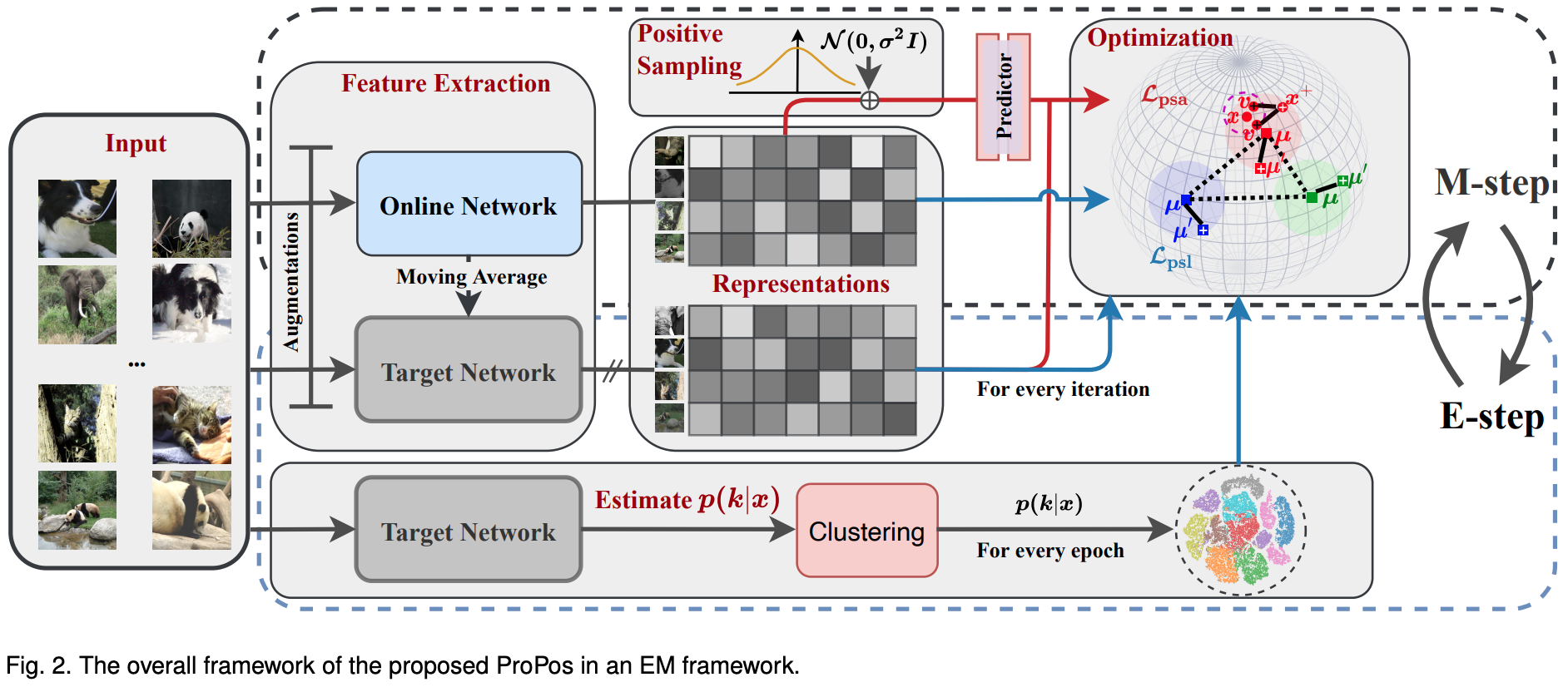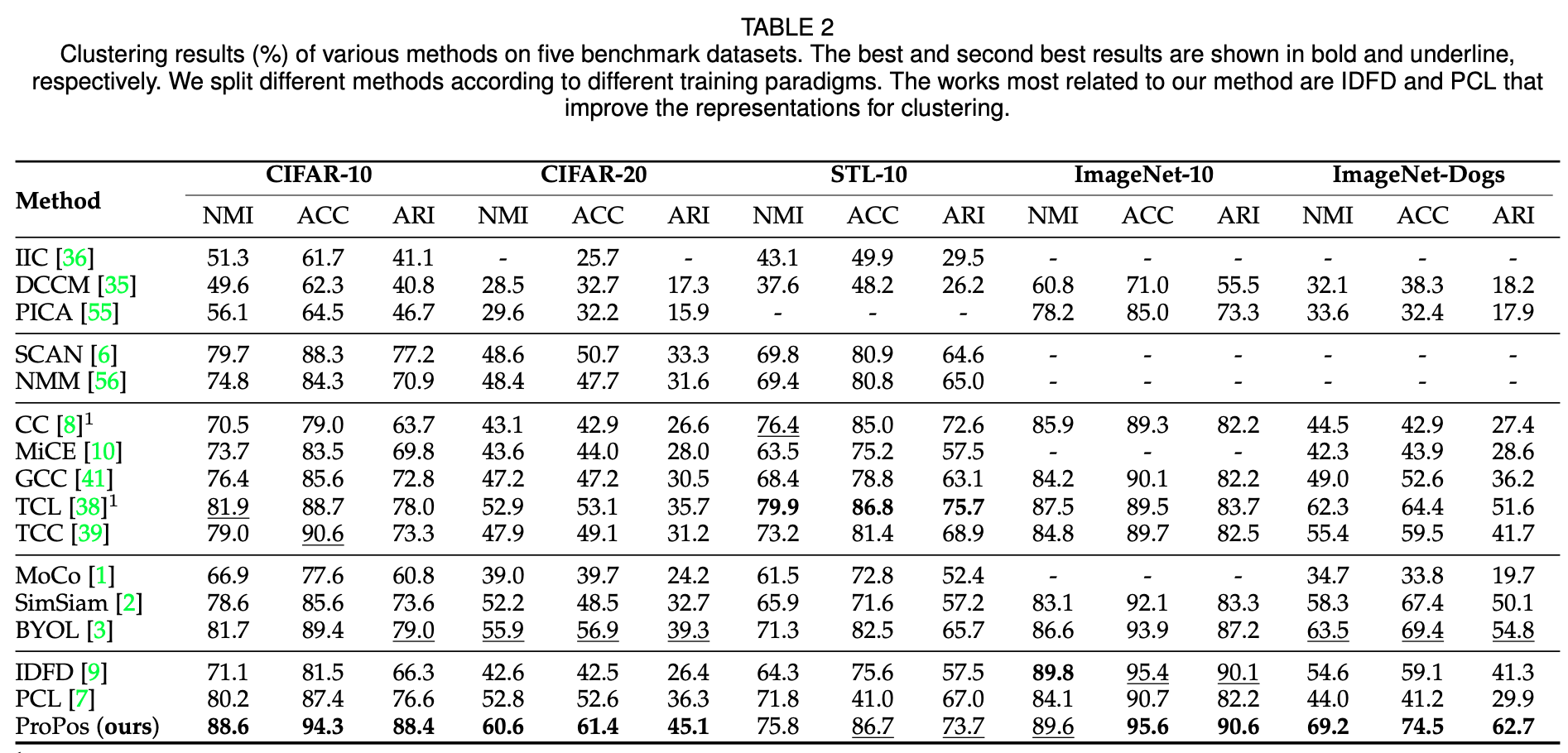This repo provides some baseline self-supervised learning frameworks for deep image clustering based on PyTorch including the official implementation of our ProPos accepted by IEEE Transactions on Pattern Analysis and Machine Intelligence 2022.
We have built new state-of-the-art performance on several benchmarked datasets.
Learning Representation for Clustering via Prototype Scattering and Positive Sampling
https://arxiv.org/abs/2111.11821
https://ieeexplore.ieee.org/document/9926200
Chinese Introduction
Abstract: Existing deep clustering methods rely on either contrastive or non-contrastive representation learning for downstream clustering task. Contrastive-based methods thanks to negative pairs learn uniform representations for clustering, in which negative pairs, however, may inevitably lead to the class collision issue and consequently compromise the clustering performance. Non-contrastive-based methods, on the other hand, avoid class collision issue, but the resulting non-uniform representations may cause the collapse of clustering. To enjoy the strengths of both worlds, this paper presents a novel end-to-end deep clustering method with prototype scattering and positive sampling, termed ProPos. Specifically, we first maximize the distance between prototypical representations, named prototype scattering loss, which improves the uniformity of representations. Second, we align one augmented view of instance with the sampled neighbors of another view -- assumed to be truly positive pair in the embedding space -- to improve the within-cluster compactness, termed positive sampling alignment. The strengths of ProPos are avoidable class collision issue, uniform representations, well-separated clusters, and within-cluster compactness. By optimizing ProPos in an end-to-end expectation-maximization framework, extensive experimental results demonstrate that ProPos achieves competing performance on moderate-scale clustering benchmark datasets and establishes new state-of-the-art performance on large-scale datasets.
If you found this code helps your work, do not hesitate to cite my paper or star this repo!
This repo contains the following baseline SSL methods for clustering:
- ProPos (Ours) [url]
- CC [url]
- MoCo [url]
- PCL [url]
- SimCLR [url]
- SimSiam [url]
- BYOL [url]
- Linear Evaluation
The detail implementations and the results can be found in models/, and in the following table 2, respectively.
I have rewritten the kmeans and GMM clustering using pure PyTorch, and the code can be found at https://github.com/Hzzone/torch_clustering.
We need first clone it:
git clone --depth 1 https://github.com/Hzzone/torch_clustering tmp && mv tmp/torch_clustering . && rm -rf tmpand then install other requirements:
pip install -r requirements.txtThe datasets used in ProPos can be downloaded from official websites.
I have provided the image files of ImageNet-10 and ImageNet-Dogs as:
- Google Drive
- Baidu Disk code cy84
The config files are in config/, just run the following command:
export CUDA_VISIBLE_DEVICES=0,1,2,3 # use the first 4 GPUs
torchrun --master_port 17673 --nproc_per_node=4 main.py config/cifar10_r18_propos.ymlor
export CUDA_VISIBLE_DEVICES=0,1,2,3 # use the first 4 GPUs
python -m torch.distributed.launch --nproc_per_node=4 --master_port=17672 main.py config/cifar10_r18_propos.ymlWe can also enable the WANDB to visualize the training!
Set the wandb parameters to true, and login to wandb.ai:
wandb login xxxI have provided some pretrained models and their training logs:
- Google Drive
- Baidu Disk code 3bag
see notebook/feature_visualization.ipynb
If you found this code or our work useful please cite us:
@article{huang2022learning,
title={Learning Representation for Clustering via Prototype Scattering and Positive Sampling},
author={Zhizhong Huang and Jie Chen and Junping Zhang and Hongming Shan},
journal={IEEE Transactions on Pattern Analysis and Machine Intelligence},
year={2022},
}
